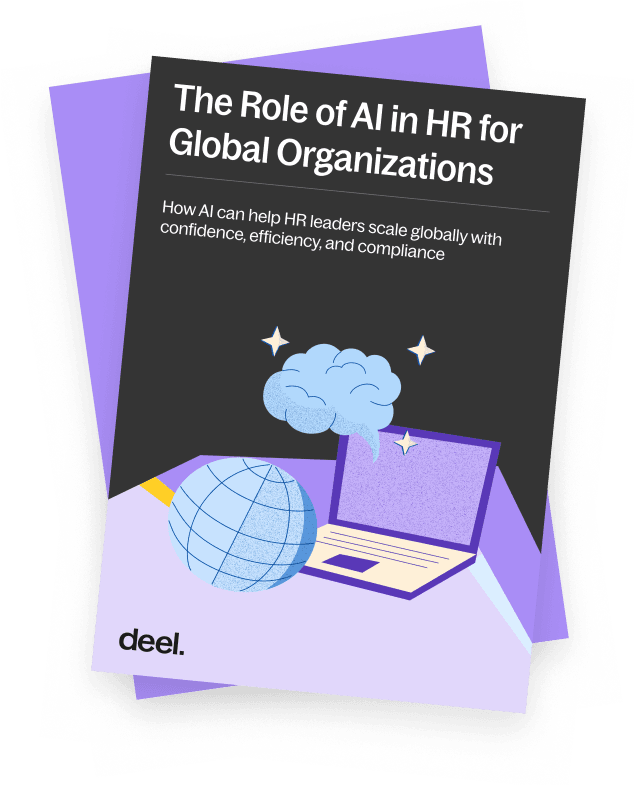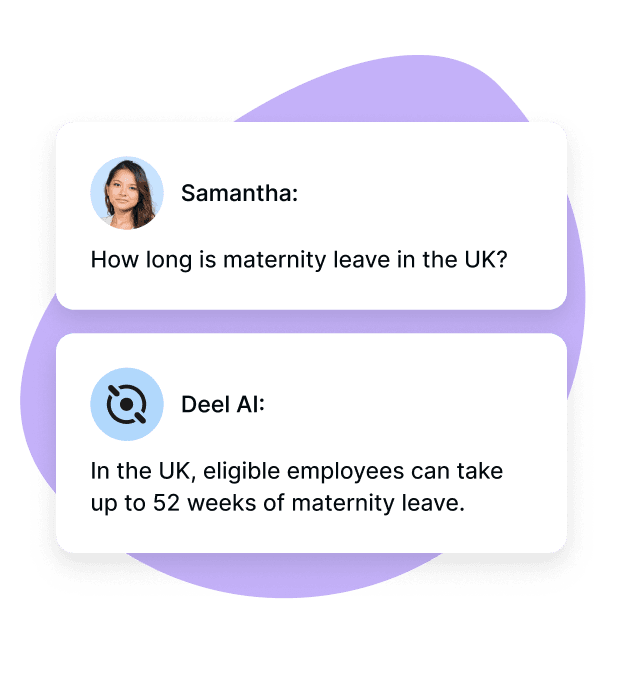Article
11 min read
Is Global Hiring the Answer to the UK's AI Skills Gap?
AI

Author
Matt Monette
Last Update
July 17, 2025

Table of Contents
Mind the gap: the hunt for AI skills in the UK
The strategic imperative of global hiring
The way forward for the UK’s AI ambitions
About the author
Matt Monette is the Director, Solutions Consulting, Global Payroll at Deel. He has worked at hyper growth SaaS companies most of his career. Most recently, leading Shopify's UK expansion in London to being the VP of Sales at a late stage startup.
In January of this year, Keir Starmer announced an action plan to make the UK a world leader in artificial intelligence (AI). It includes building a ‘supercomputer’ to ensure the UK can produce its own AI models, rapid piloting AI-powered services in the public sector, and creating “AI growth zones” to foster AI in the private sector.
Recruiters up and down the country are all thinking the same thing: that’s going to take a significant amount of people power. With the UK already facing skills shortages across multiple industries, does it have the “elite AI talent” the action plan requires?
At Deel, we set out to answer that question. What our survey found is that the UK talent pool is not currently up to the challenge of transforming the country into the AI powerhouse the government imagines it to be. Instead, business leaders are looking overseas for their AI needs.
Mind the gap: the hunt for AI skills in the UK
The government’s plan pledges to create 13,000 jobs in the tech sector. However, 38% of survey respondents said that IT, tech, and AI positions are the most challenging to recruit for.
As the UK races to cement its position as an AI leader, it’s concerning that the very people who will be driving private sector innovation are proving the hardest to find. Without the right talent, the country’s ambitions could be at risk, potentially stalling the UK tech sector’s growth and competitiveness.
So, where is all of the UK’s potential AI talent? The reasons behind the talent gap are complex and varied:
- The gender gap: Only 22% of people in AI roles are women, across the early years of education up to senior positions in the industry. While a few prominent industry voices have warned against letting AI become a ‘boy’s club’, there has been little significant progress in actively encouraging women to enter the field.
- A lack of professionalisation: A lack of standardised job titles and consistent terminology to describe skills and knowledge levels creates a disconnect that makes talent sourcing difficult. This confusion makes it hard for recruiters to assess candidates, and for candidates to effectively position themselves.
- A lack of AI education: 73% of people in the UK have had no AI education or training. Not only are people lacking the digital skills needed for a career in AI, but there’s an overall lack of understanding and trust in the technology – a clear and urgent barrier to entry.
There are undoubtedly countless efforts to solve these talent blockers, but in the short term, what’s the answer? Without wanting to put their AI growth plans on hold while waiting for the UK talent pool to catch up, many business leaders are looking overseas to plug the talent gap.

The strategic imperative of global hiring
I’ve already spoken about how borderless hiring is a strong solution to the UK skills gap at large. Hiring from abroad lets organisations expand their nets for identifying the right skills for plugging technical gaps. Not only does it bring in the talent necessary for today’s tech challenges, but it also sets the stage for sustainable growth in a world where workers are increasingly demanding flexibility to work from anywhere.
Evidently, this is something business leaders in the UK also recognise. According to our survey:
- 43% are open to hiring internationally to plug the AI skills gap
- 23% are actively planning to accelerate their international hiring over the next 2-3 years, specifically to plug skills gaps
- Top markets for sourcing hires include the US (51%), Europe (51%), and Canada (32%)
While this enthusiasm for global hiring is encouraging, it’s not without its challenges:
- Respondents flagged blockers that make international hiring more difficult:
- Compliance - 50%
- Stricter policies around immigration - 52%
- Complex legal requirements - 55%
Facing these challenges without expert support can be daunting, which is why choosing the right partner for global hiring is essential. With the right tools and guidance, UK businesses can confidently close skills gaps in the short term, and drive innovation and resilience over the long term.
Deel AI
The way forward for the UK’s AI ambitions
For long-term AI leadership, the UK must nurture a strong AI talent pool. HR can encourage this by championing the development of internal training initiatives on AI literacy and AI tools. Additionally, HR leaders should play a central role in building robust talent pipelines with educational institutions and help standardise job titles and career paths within AI.
As for global hiring, the solutions are already at our fingertips and directly address the blockers already raised by UK businesses. Thanks to new HR technologies, borderless hiring is more seamless than ever before. Take, for example, Deel EOR (Employer of Record), which legally employs overseas workers on behalf of companies. An EOR removes the three most significant blockers to international hiring, as identified by our survey:
-
Compliance: The biggest compliance risk is worker misclassification. By using an EOR, this risk is removed by classifying workers as employees. Other legal risks, such as contract regulations, are shifted to the EOR. On top of that, Deel’s Compliance Hub automatically provides relevant regulatory changes (eg, minimum wage adjustments) to help demystify the complex world of international labour laws.
-
Stricter policies around immigration: With an EOR, there’s no need for overseas workers to relocate. However, if you do need to bring people on-site, Deel Immigration offers a fast track through the employee immigration maze.
-
Complex legal requirements: Deel manages all legal requirements, from contract generation to termination protocols and local wage laws, with always-on HR compliance. We mitigate more legal risk for your international operations than any other provider, across 150+ countries.
In short, Deel offers global hiring without the headaches. You can onboard international talent within days, without the complexities of establishing your own local entity. To see how Deel can help you unlock a world of AI talent, book your 30-minute demo.
Live Demo
Get a live walkthrough of the Deel platform


Matt Monette is the Director, Solutions Consulting, Global Payroll at Deel. He has worked at hyper growth SaaS companies most of his career. Most recently, leading Shopify's UK expansion in London to being the VP of Sales at a late stage startup.
















